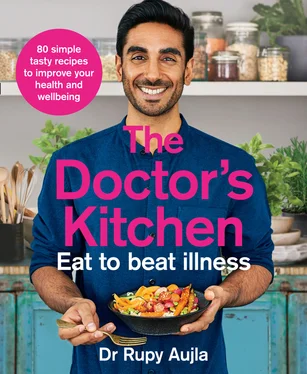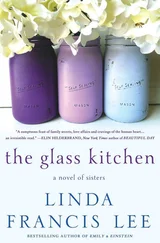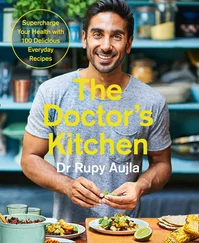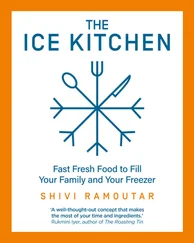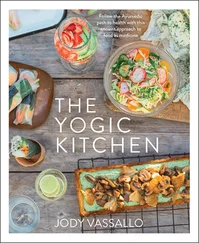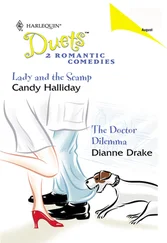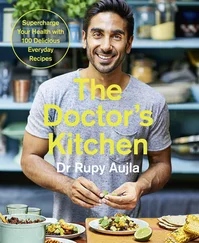+ Omega-3-rich fatsFound in oily fish, nuts and seeds, plus extra-virgin olive oil. The long-chain Omega-3 fatty acids are of particular interest, as they have been shown to promote the growth of brain cells which can help maintain the adaptability of the brain. 21These sorts of fats are potentially key components of the brain’s neuroplastic ability. Another benefit of nuts, seeds and oily fish in the diet is the quality protein they provide. These ingredients are broken down into amino acids (the building blocks of protein) which are used for the production of neurotransmitters, the chemical messengers of the brain that are created every time your brain centres need to send signals. 22Adequate stores of good-quality protein ensure the availability of these nutrients for the production of these essential chemicals. Try the Almond and Hazelnut Lentils with Capers (see here) to get nuts into recipes.
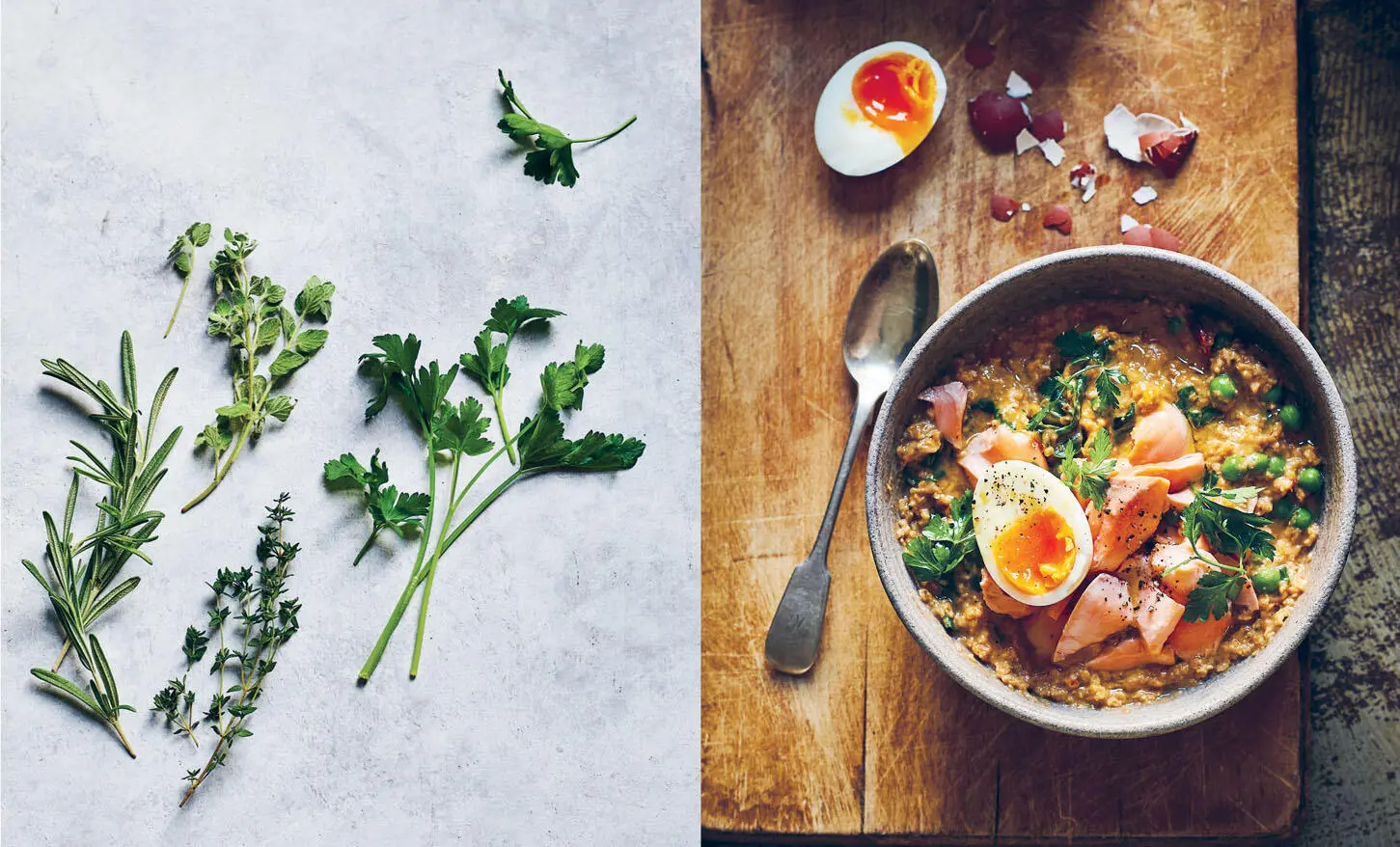
+ BerriesThese have received a lot of attention for being brain protective, with good reason. They are rich sources of polyphenols, including anti-inflammatory resveratrol and quercetin, but they may also be involved in the production of brain-derived neurotrophic factor (BDNF). 23BDNF is involved in the maintenance and survival of nerve cells and could be a critical component of protecting the brain against disease but also enhancing cognitive ability. I always have a mixture of berries in my freezer at home for convenience because they are as nutrient-dense as fresh and much less expensive.
+ Whole grainsExamples of these, including red rice, rolled oats and quinoa, are great sources of antioxidants, fibre and B vitamins, which are essential for brain health. 3The brain is a sugar-dependent organ but excessive sugar that disrupts the normal mechanisms governing the control of glucose in the bloodstream has been shown to negatively impact brain cells. 11, 24, 25
This is why whole grains with the fibre attached are so important from the perspective of sugar control. Rather than blindly counting carbohydrates and removing anything labelled a ‘carb’ I urge patients to consider the quality of ingredients. Barley, corn and millet are nutritionally very different to breads, pasta and cakes, yet they are all lumped together under the same banner of ‘carbohydrate’. Whole grains are what we should be eating as they release sugar into the blood gradually and have not had the important nutrients stripped away from them. My Sri Lankan-style Oats (see here) are a great way of using whole grains in an unusual dish.
+ WaterPerhaps the easiest to access and the most commonly forgotten ingredient of all is simply water. All too often I ask patients about their drinking habits only to discover a shockingly low amount of hydration! Discounting certain medical conditions that would contradict 2 litres of plain water a day, and excluding tea and coffee (which can actually dehydrate us), this is how much we should be aiming for. It is essential for nutrient transfer across brain cells, delivering oxygen as well as maintaining the integrity of cell structures. The simple act of hydration has been demonstrated in clinical studies to improve cognitive performance and there’s no reason why we shouldn’t all be drinking adequate amounts. 26Drink for your mind.
+ Herbs and spicesMost of these contain key antioxidants and phytochemicals (chemicals produced by plants) that can reduce oxidative stress. 27As a general rule of thumb, using simple kitchen herbs like rosemary, basil, oregano and mint in your cooking is a great way to reduce inflammation and improve the enjoyment of food. Certain chemicals labelled ‘adaptogens’ or nutraceuticals, including ashwaganda, curcumin and gingko (to name just a few), have been given a lot of attention in the press over recent years, claiming to boost brain health with regular consumption. While I welcome greater research into compounds that are safe and well tolerated, the biggest impact on brain health is not going to come from a nutraceutical pill. I wouldn’t like anyone to believe that simply taking supplements in isolation is the best way to protect your brain. It’s going to be your plate and lifestyle that has the biggest impact.
LIFESTYLE 360
I could talk extensively about micronutrients, including vitamins E and D, or the power of individual phytochemicals, but this would neglect the importance of ‘food synergy’. We don’t eat nutrients in isolation and I’m a firm believer of an integrated dietary approach. By overanalysing single elements of our diet we miss the wider picture about the combinations of food we consume and how difficult it is to tease out what’s having an impact. We need to experiment with new and delicious ingredients but in addition, the synergistic effect of lifestyle alongside diet is a powerful combination to be reckoned with.
+ Mental training and stimulationThese have been observed to increase a type of material in the brain called ‘grey’ matter that makes up parts of the brain involved in emotion, coordination and perception. 28You don’t have to just do Sudoku or mathematical exercises – meditation and mindfulness regimens have also been shown to demonstrate increases in grey matter. 29Playing a musical instrument, singing or any activity that focuses attention may lead to benefits and are worth the time investment to keep your brain healthy.
+ Chronic stressIt has been shown that a high level of stress induces structural changes in the brain, which suggests our emotions are potent modulators of our brain’s anatomy. 30, 31In clinic, I emphasise the need for simple stress-relieving strategies, such as yoga, deep breathing and meditation, that heighten neural activity in the brain’s pleasure centres and improve our tolerance to stress. 32These powerful tools are accessible to everybody and, if taught appropriately, research shows can be very effective.
+ ExerciseHigh intensity interval training (HIIT) and endurance exercises reduce the incidence of cardiovascular disease, which would ultimately reduce the likelihood of cognitive decline. But exercise itself also induces the production of ‘neurotrophic’ factors that enhance nerve cell generation and protect against shrinkage of the brain that occurs as we age. 33Our bodies are designed to move constantly, but I find that many patients are confined to their desks in their working environments. Whether it’s a case of getting a standing desk or taking the stairs, I advise to try to move as much as possible throughout the day – exercise is not confined to the gym. Your brain will thank you for it.
+ SleepSleeping to both protect and greatly enhance brain function is the lowest hanging fruit, yet few of us practise good sleep hygiene. The constant stimulation from TV platforms and mobile electronic devices creates an environment associated with disrupted sleep. During sleep your brain’s lymphatic system (the system that removes toxins and waste products as a result of normal cellular processes) gets to work to clear debris that can impact the functioning of your nerve cells. 34There is a clear link between poor sleep and a higher likelihood of cognitive decline, and on the other side of the spectrum, boosted cognitive performance when you are well rested. Getting a good quality 8–9 hours of rest per 24 hours is one of the simplest ways to boost brain health. Make yourself a promise: try it for 7 days and monitor how you feel. It will revolutionise what you prioritise.
By employing all these tactics we can positively impact our brain on multiple levels. We have the power with our diet to reduce inflammation, stimulate brain growth factors, promote neuronal cell production, reduce oxidative stress and improve many other processes that we have yet to discover. As well as all these dietary and lifestyle changes being protective, the aforementioned activities are also being considered in management to improve outcomes or prevent further decline in patients to good effect. This is where we need to invest more of our time and resources, but I’m making this vital information accessible to you right here. Don’t wait for the prescription pad. Take advantage of these points and start looking after your brain health right now. As you’ll discover in all the other chapters in this introduction, eating and living well doesn’t solely effect your brain health, but rather your entire ecosystem.
Читать дальше
